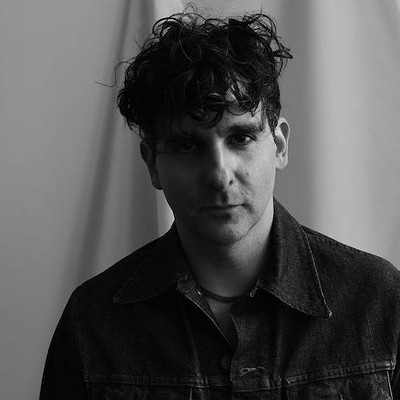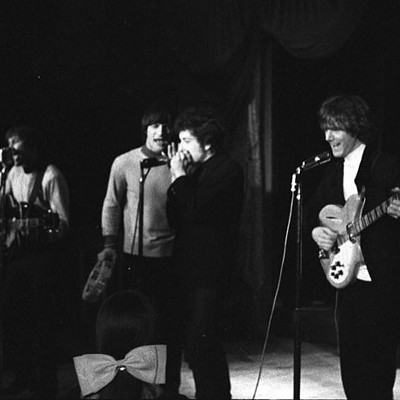If it’s January, Revolver’s "Hottest Chicks In Hard Rock" calendar must be out. As we move into the New Year, you can expect to see it in the greenrooms and offices throughout the music industry. Love it or hate it, the calendar represents the reality of music media faced by many female musicians. Under the ubiquitous guise of “exposure,” we subject these artists to a familiar if largely unspoken expectation: we want to look at you, but not necessarily hear you.
Even starting a conversation about sexism in music media is not unlike asking someone if they believe the sky is blue: we all agree it’s a problematic institution in our society, and that it exists, but no one really knows what to do about it.
Sexism is rampant in our culture, hardly limited to music. It’s the reason why Angela Merkel can be Germany’s prime minister for ten years and win Time Magazine's Person of the Year while we're still arguing whether Hillary is "likable" enough — and where T.I. can rant that he’d never vote for a woman president, retract that statement and have thousands of men support him anyway.
Nor are men excluded from sexism by any stretch, from toxic masculinity to roles that confine men solely as breadwinners and a family-court system that often denies the importance of men's parental role. But while men and women may both suffer under sexism’s wrath, when it comes to music media, for women it is wholly brutal.
Revolver's patronizing attitude toward the "hottest" women in metal and hard rock has come under fire before. While it’s well-deserved for defining women in body-shaming terms by excluding musicians who don’t make the "hottest" cut, it also creates unnecessary competition among women that has nothing to do with the music they make. Worse, the accompanying questions to these articles do not even touch upon things like skill, technique or musical capabilities. All examples like “Who do you think is totally hot?” and “What the wildest thing you’ve ever done?” do is make my eyes roll back in my head...double in some cases.
Ask these questions to a male band and watch them walk out of the interview. Sure, Revolver may be giving female musicians media coverage they otherwise wouldn't see, but if your argument is that they should be grateful for the opportunity to pose for a calendar, then clearly you're ignorant of the real problem — that female musicians aren’t getting enough media coverage for their music, on its own terms, in the first place. Instead, Revolver continues to objectify these women with coverage meant for little more than gratuitous gawking.
And, let's be honest, many publications (even this one) have published content of this nature in the past. But many of those same publications (including this one) have also progressively moved away from such pieces. For that we are thankful, but it begs the question: why doesn't Revolver self-correct, too?
While the magazine can be praised for sponsoring a tour to support these artists, its 2015 edition deserves a critical look. Occurring only over a few weeks in April and May i n mostly small market towns, with only one Saturday night gig in a Top 10 market (the Gas Monkey in Dallas), is not exactly prime exposure. Why not combine the tour with the same magazine's hugely successful "Golden Gods Tour" for some real coverage? It doesn’t make sense.
Let’s face it, the real issue here is the use of the words “Hottest Chicks.” A sophomoric term like that reduces female artists to the lowest common denominator. Whereas the (mostly male) nominees for Revolver's "Golden Gods" awards get some kind of deifying celebration, besides just glorifying their respective Y chromosome and penis — one shreds guitar with superlative skill, the other one is just bangable. See the problem? Even Maria Brink of In This Moment, herself a "Hottest Chick" alumna, elaborated on the vapidness of sexism in music, saying, “If you're just going to rely on [being sexy] you're not gonna get very far.”
Apparently, it’s all you get in this business.
The media may spotlight a pretty female musician without any requests to do so, yet if that same musician should gain weight like Kelly Clarkson did, God help her. The endless roasts, jokes and body-shaming disguised as "health concerns" could well be the type of media attention Clarkson will enjoy for years to come by an overwhelming amount. And she's nominated for a Grammy this year.
Instead, shaming is the media standard, and outlets do it under the false assumption of protecting us from the evil influence of wayward females.
But why talk about sexism at all? Because trends in media are really trends in our culture. It’s reflective and symptomatic of larger issues, namely gender expectations. Journalists who promote restrictive gender codes by crafting questions and conversations around their own biases and microaggressions are really perpetuating these unrealistic standards upon our culture, and therefore upon all women.
Denying its seriousness is also denying the power the media has over culture. From demands on women’s bodies to be uniformly thin or sexy to literally tearing apart women simply because they’re women, the music media is relentlessly judgmental and misogynistic.
And, frustratingly, music media would rather focus on image and beauty than musical skill. Most of the discussion in a recent Vanity Fair article on Rihanna hinged on her image and appearance. In fact, the very first question was about her weight. It’s as if we’re all safe to talk about image and diet tricks, but it becomes uncomfortable to discuss matters of serious import. We think it's okay to openly praise our eating disorders while ignoring discrimination and denying there’s a link between them.
If eating disorders are fueled by unrealistic body standards set forth in the media which perpetuates that male gaze, then women are killing their bodies in hopes of winning male favor. This deeply subconscious style of thinking goes like this: If I satisfy Male Gaze, then I’m worthy of enjoying the privilege of being loved by men, because I meet their expectations for a woman's appearance. Reject the body standard and watch the media destroy that celebrity. Fighting the standard won't help. It didn’t work for Kelly Clarkson, Pink, Mariah Carey and a slew of others.
Perhaps the most serious underlying assumption by music journalists is that women can’t write or play music to the level of their male counterparts. Bjork was recently quoted having to correct journalists who assume she doesn’t write her own music, and that her male band members do so for her. Even Halestorm's Lzzy Hale of Halestorm was asked, “[Why] girls...don't rock, you know?”
Other times, music-media interview questions place unrealistic ambitious expectations upon female musicians. The trite phrasing of “[She] is such a groundbreaker” is wholly untrue. At no point in 2016 is any female a groundbreaker; this is just reflective of journalism’s ignorance of the contributions females make, and of the way they have been ignored in the media. Female musicians have always been there; failing to acknowledge their contributions throughout history is ridiculous.
Besides that, women aren’t allowed to explore the same kind of subject matter as male musicians without scrutiny. So much mistrust and suspicion surrounds any female musician who dares to challenge the status quo. For example, Katy Perry was openly accused of satanic worship following her "Dark Horse" video and 2014 Grammy performance. Let an all-male metal band perform the same faux-ritualistic act and no one will utter a protest. Yet for Perry, Christian performer Natalie Grant publicly left the show, and Perry and her family still suffer persecution from right-wing zealots.
Sure, some media outlets certainly get it right. Huffpost Women , for example, closely monitors how women are treated in media and is quick to call out unfair biases. Glamour.com hosts a feminist-friendly music page catering mostly to pop fans. A plethora of women in metal can be found on metalladies.com and as its name suggests, feministmusicgeek is a top source. Yet sadly, the issue of sexism in music media remains.
What if we had a conversation about sexism in media and people not only cared, but reacted in such a way that media access granted people exposure who were talented despite their size, religion, race, gender, sexuality or any other defining quality? Because talking about sexism in media means that people must first see it as a problem.
Standards for beauty would instead embrace unique individuality, and people would express themselves through fashion and identity as they wished. Interviews would endorse the belief that all women are capable of writing and creating deeply expressive and intelligent music, and that we can actually all learn from them. (Men included.)
People would openly shame media that glorified sexist ideology, and fans would embrace music because it was good, not because it’s performed by someone good-looking. Even music would change. Its message would still celebrate sex and love but in a way that’s non-exclusive and not hurtful. The need for subgeneres like Riot Grrrl and Queer punk would be lifted, because those artists wouldn’t be excluded in the first place. There would be no need to create a safe environment if one already exists.
Most importantly, artists would be so self-assured of exposure that they could turn down media requests if they wanted to. Since most of them already have access to the Internet, they already can promote themselves through social media, do tours and connect to better press outlets without having to promote anything other than their God-given talent if they chose to do so.
And if they chose to pose for a calendar, they wouldn't do it out desperation for national coverage, but because they chose to add it to an already-full press portfolio. These things can happen for musicians if we call bullshit on sexist media when we see it.
Support Us
Houston's independent source of
local news and culture
account
- Welcome,
Insider - Login
- My Account
- My Newsletters
- Contribute
- Contact Us
- Sign out
[
{
"name": "Related Stories / Support Us Combo",
"component": "11591218",
"insertPoint": "4",
"requiredCountToDisplay": "4"
},{
"name": "Air - Billboard - Inline Content",
"component": "11591214",
"insertPoint": "2/3",
"requiredCountToDisplay": "7"
},{
"name": "R1 - Beta - Mobile Only",
"component": "12287027",
"insertPoint": "8",
"requiredCountToDisplay": "8"
},{
"name": "Air - MediumRectangle - Inline Content - Mobile Display Size 2",
"component": "11591215",
"insertPoint": "12",
"requiredCountToDisplay": "12"
},{
"name": "Air - MediumRectangle - Inline Content - Mobile Display Size 2",
"component": "11591215",
"insertPoint": "4th",
"startingPoint": "16",
"requiredCountToDisplay": "12"
}
,{
"name": "RevContent - In Article",
"component": "12527128",
"insertPoint": "3/5",
"requiredCountToDisplay": "5"
}
]
KEEP THE HOUSTON PRESS FREE...
Since we started the Houston Press, it has been defined as the free, independent voice of Houston, and we'd like to keep it that way. With local media under siege, it's more important than ever for us to rally support behind funding our local journalism. You can help by participating in our "I Support" program, allowing us to keep offering readers access to our incisive coverage of local news, food and culture with no paywalls.
Trending Music
- How Much Longer Can Classic Rock Rule the Roost?
- Top 10 Butt-Rock Bands of All Time
- Low Cut Connie Keeps One Foot In The Gutter
-
Sponsored Content From: [%sponsoredBy%]
[%title%]

Don't Miss Out
SIGN UP for the latest
Music
news, free stuff and more!
Become a member to support the independent voice of Houston
and help keep the future of the Houston Press FREE
Use of this website constitutes acceptance of our
terms of use,
our cookies policy, and our
privacy policy
The Houston Press may earn a portion of sales from products & services purchased through links on our site from our
affiliate partners.
©2024
Houston Press, LP. All rights reserved.





